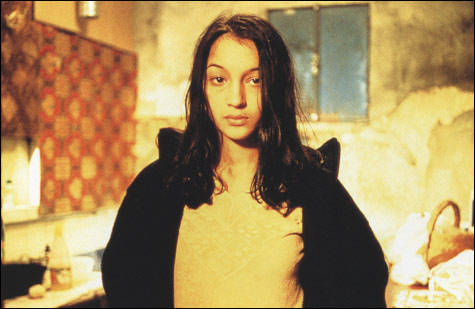
OSSOS: Pedro Costa makes Bresson look like Michael Bay. |
“The First Boston Palestinian Film Festival” | Museum of Fine Arts: September 27–October 9 “Colossal Works: The Films of Pedro Costa” | Harvard Film Archive: September 28-30 |
Film, like most arts, tries to turn misery into entertainment. It applies its magic to suffering, injustice, and futility in the hope of transforming them into understanding, wisdom, and catharsis — or the illusion thereof. Some misery defies film to make sense of it, or to remain true to it and still keep an audience entertained, but that doesn’t stop the naive, the idealistic, and the committed from trying.The filmmakers represented in the Boston Palestinian Film Festival at the Museum of Fine Arts confront the troubles of that hellish area with documentary, fiction, allegory, and combinations of the three. In his obsessive study of impoverished Cape Verdeans living on the margins of Lisbon, Pedro Costa resorts to those genres and more, including some of his own that I don’t think anyone has quite put a name to yet.
The Palestinian films are more conventional and accessible — no surprise, since the turmoil they deal with is more intractable and far-reaching. Three of the features, each in a different genre, outline a brief history of the region. Based on the experiences of his Palestinian ancestors, Chilean director Miguel Littin’s LA ÚLTIMA LUNA (2005; October 5 at 7:30 pm, with the director present) takes place in the midst of World War I, when the British and Arab rebels challenged the Ottoman Empire for control of the area and Jewish Zionists began settling there en masse. A period that seeded many of the conflicts to come, it was in some ways a prototype of the current crisis.
Such is Littin’s argument, at any rate, and the film at first makes a convincing and sometimes charming case. Solymann (based on Littin’s great-grandfather) is a Christian Arab who doesn’t want to get involved in the battle between those seeking independence and the Turks. He’s further antagonized his neighbors by selling land to an Argentine Jew; he’s even helping Jacobeo in building a house. Their growing bond almost makes peace between Arabs and Jews look possible. But things happen fast in the last act of the movie, as seduction, treachery, and violence erupt and the men’s friendship falls apart. So too does the movie, its humane logic spinning out into melodrama.
Jump ahead around a century from the scene in Luna in which Solymann helps Jacobeo pile up stones and you’ll find a rueful counterpart in Udo Haar’s documentary 9 STAR HOTEL (2007; October 4 at 7:45 pm). A young Palestinian stacks up some rocks to show how he’ll build the title establishment when he owns his own construction company. They collapse, to the laughter of his friends. He’s one of scores of illegal laborers who leave Palestinian territory to find work building a new Israeli town. They cross streams, busy highways, and checkpoints and brave patrols (in scenes eerily reminiscent of those on the US/ Mexican border) to erect homes for those they regard as usurpers — because that’s the work that’s available. Haar’s cinéma-vérité record renders vivid portraits of disenfranchised people who are desperate but decent and determined.
For some, like Bashar in Nicole Ballivian’s DRIVING TO ZIGZAGLAND (2006; October 7 at 7:30 pm), with the director present), the stress of living in an occupied country is too much. Or maybe Bashar moves to LA because he’s an actor and wants to become a movie star. Either way, since he won’t take roles as a terrorist (the only ones offered), he must drive a cab to make ends meet. Based on “true stories,” the film joins Bashar on a 24-hour shift as he tries to make enough money to pay his utilities bill. Many of his fares are stereotypical American boneheads whose ignorance he tries to escape by telling them that he’s from the imaginary country of the title. If they don’t buy that, then he resorts to the requisite lectures. These scenes aren’t much fun, and they’re less instructive than the encounters in which Bashar’s basic good nature and sense of humor shine through.
Those looking for fun might take a pass on Pedro Costa. In his film, misery loves company — in this case the audience. He shows no mercy, and after watching the seven hours of his magnum opus — the “Las Fontainhas” trilogy, set in that Lisbon slum and featuring the lives of its residents — I felt as I had been beaten up. But perhaps I was the better for it.
OSSOS|BONES (1997; September 29 at 5 pm, with the director present) offers the semblance of a conventional plot (similar to that reprised by the Dardennes Brothers in 2005 in L’enfant, which in comparison is a lighthearted romp) and a reasonable length. Waiflike, unwed Tina gives birth and tries to kill herself. The child’s father uses the baby to beg and then tries to sell it. Tina seeks aid and consolation from her pal Clotilde (Vanda Duarte, a recurrent figure in the films). This story emerges as if dreamed off screen, as the camera lingers on long, Rembrandt-esque close-ups, longer shots of people posed in doorways, and even longer track shots of people walking through alleyways. By comparison, Bresson was a regular Michael Bay.